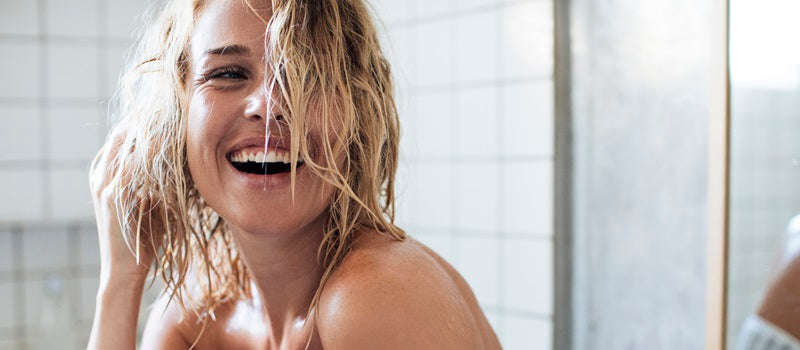
Are you constantly battling oily, greasy hair? Whether it’s your roots, tips, or everything in between, greasy hair can ruin your style and make all of your efforts fall flat within a couple of hours. And if you’re tired of the “trendy” advice of relying on dry shampoo — “just wash your hair once a week!” — you’re not alone.
While a little dry shampoo might work as a quick pickup, it’s not a long-term solution for everyone. And for those of us with a LOT of extra oil, you might even feel like washing your hair once a day isn’t enough!
Read on as we take a look at common causes and helpful solutions for oily hair, especially during the summertime.
Is My Hair Actually Oily, or is it the Heat?
Ever wondered why your hair feels so oily in the summer? Extra oil is just one of the common summertime hair concerns, but keep in mind the distinction.
In the summer, extra grease can be caused by sweating more, overusing drying products (think sea salt spray and texturizing spray), wearing your hair up in a ponytail, and even putting your sunglasses on top of your head. So if you’ve got these hair habits, consider taking a break from them every now and then.
Other things that can cause oil? Touching your hair often is a sure way to transfer the oils from your hands to your strands. Try not to run your fingers through your hair (which, we know, it’s oh-so-tempting when you’re having a great hair day!), especially if you use lotion or moisturizing soap on your hands.
Another common factor is overusing products, especially those not meant for your roots and scalp. Products like hair masks, serums, and shine spray should be applied to the mid-shaft down to your ends; otherwise you risk product build-up and dirty-looking hair. Same goes for over-washing, which may seem counterintuitive.
Different people have different needs, so experiment with washing every other day if you can, to avoid stripping your hair of its natural oils and causing it to overproduce to replace them.
How to Tell if Your Hair is Naturally Oily
Here’s a simple test to see if you have oily hair: after washing your hair, dry it as you normally would and then dab a tissue onto your scalp. If you see patches of oil on the tissue, or you notice your hair sticking or clumping together in the area you tested, you likely have oily hair.
Other telltale signs include:
- Your hair looks dull most of the time.
- Your hair looks flat and limp soon after washing.
- You’re experiencing hair loss or dandruff (yep, both dry and oily scalps can cause the dreaded flakes).
But Isn’t Oil Good for Hair?
Hair oils and oil-infused shampoos and serums have had their moment, but should you avoid them if you hair naturally oily hair? The answer is… yes and no.
While adding oils to your roots may exacerbate the issue, don’t forget the rest of your strands. Just choose wisely, selecting natural oils like argan and products without a ton of additives that can weigh down your hair. Our Miracle Oil Plus Keratin, for example, is chock full of strengthening keratin and nourishing argan oil, giving your ends the TLC they need and protecting your hair from heat styling and environmental factors.
Also, use any hair oil sparingly! A little goes a long way.
For the rest of your hair, keep the following ingredients and products in mind for a great hair day.
How to Find the Best Shampoo for Oily Hair

When it comes to picking the best shampoo for oily hair, a few specific ingredients come to mind. Check your ingredients label and look for things like:
- Acai berries: Full of folic acid, zinc, and vitamins A, C, E, and B, acai berries keep your scalp healthy and balanced.
- Chamomile: Look to chamomile extract in your products as a gentle, nourishing cleanser that strengthens your hair from within.
- Green tea: Another ingredient that works wonders with balancing your hair and scalp’s moisture levels, green tea can reduce sebum production.
- Marshmallow root: With its soothing and antibacterial properties, marshmallow root can restore your scalp while also gently softening your hair.
- Keratin and other proteins: If your ends are dry, use a keratin-infused product to strengthen and restore your hair.
Beyond the ingredients list, look for key descriptive words on your shampoo and hair products like:
- Clarifying
- Volumizing
- “Light” versions of products (our Miracle Leave-In Lite, for example!)
- Sulfate-free, especially if you have naturally curly or wavy hair
Drugstore vs. Salon Shampoo: Does it Matter?
So in the battle for the best shampoo for your oily hair, which is better: drugstore brands or salon brands? While both might tout the ingredients and buzzwords we listed above, there’s a lot more at play.
Just like organic and natural foods are different from the name-brand cheese puffs you see at the store, salon-accredited shampoos are often better quality and better for your hair overall. When you invest in a quality hair product, you’re getting highly-concentrated ingredients that have been tested for true results. (It’s a 10 products take years of testing, for example, and we perfect each formula until it truly is a “10!”!)
Drugstore brands might cost less, sure. But you’re often receiving a product diluted with water, so you’re getting less of the ingredients you need — even if it’s listed on the bottle. Or worse, some drugstore brands have harsh ingredients like alcohol and other additives that strip your hair of moisture.
Moreover, unless you’ve avoided heat styling, coloring, or ponytails your entire life… chances are your hair could use some TLC to look its best. Just think about it this way: your shampoo is something you’ll be using every day or close to it. Don’t you want to invest in the long-term health of your hair?
So — are you ready to combat your oily hair and ensure a great hair day? Shop It’s a 10 products, or check out more hair tips and tutorials here!
